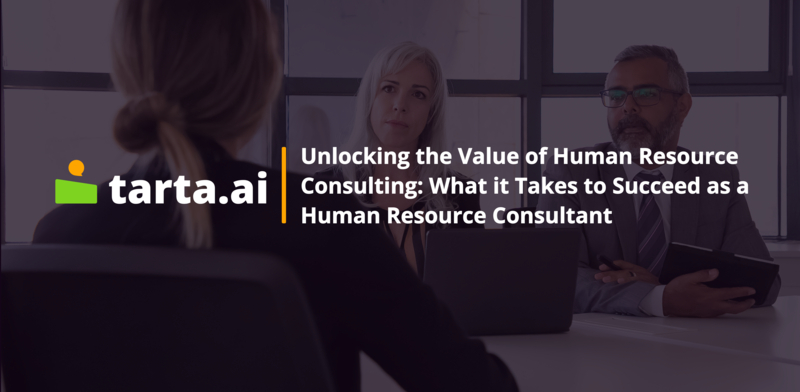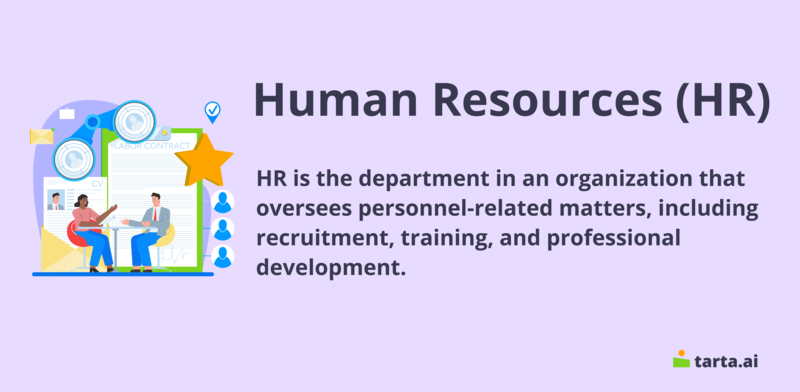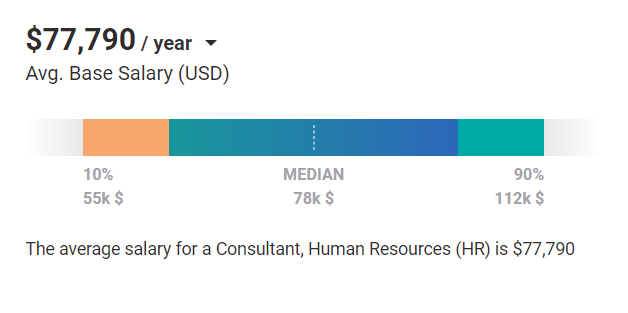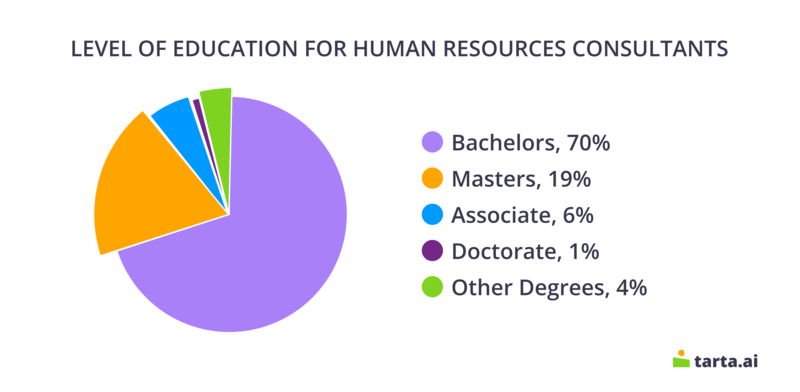Unlocking the Value of Human Resource Consulting: What it Takes to Succeed as a Human Resource Consultant

"Human resources are like natural resources; they're often buried deep. You have to go looking for them; they're not just lying around on the surface." - Ken Robinson
Job description
Human Resource Consultants are professionals who provide expert advice and support to organizations on a wide range of HR matters. They help businesses optimize their human capital, manage employee relations, and comply with labor laws and regulations. In this article, we'll explore what it takes to become a Human Resource Consultant, what their main responsibilities and additional duties are, and what hard and soft skills are required for this role.
Human Resource Consultants typically work for consulting firms, staffing agencies, or as independent contractors. They may serve clients across multiple industries or specialize in a particular field, such as healthcare, finance, or technology. They can also work on-site or remotely, depending on the needs of their clients.

Requirements
To become a Human Resource Consultant, you typically need a Bachelor's or Master's degree in Human Resources, Business Administration, or a related field. Some employers may also require professional certifications, such as the Society for Human Resource Management (SHRM) Certified Professional (SHRM-CP) or Senior Certified Professional (SHRM-SCP) credential.
In addition to formal education and certifications, successful Human Resource Consultants possess a range of skills and qualities that enable them to deliver value to their clients.
Responsibilities
Main Responsibilities | Additional Information |
Conducting HR audits and assessments | Identify areas for improvement and compliance risks. Analyze and evaluate HR policies, procedures, and practices.Develop recommendations for improvement |
Developing HR policies, procedures, and best practices | Align with the organization's goals and values. Ensure compliance with laws and regulations. Communicate policies and procedures effectively to employees |
Providing guidance and support on employee relations issues | Advise on performance management, disciplinary actions, and grievances. Resolve conflicts and mediate disputes. Ensure compliance with employment laws and regulations |
Designing and implementing compensation and benefits programs | Develop strategies to attract, retain, and motivate employees. Conduct market research and benchmarking. Analyze and evaluate the effectiveness of existing programs |
Conducting training and development programs | Enhance employees' skills, knowledge, and engagement. Develop training programs that align with the organization's goals and values. Evaluate the effectiveness of training programs |
Keeping abreast of the latest HR trends, technologies, and regulations | Stay up-to-date with changes in laws, regulations, and best practices. Evaluate and recommend new HR technologies and tools. Attend conferences and training sessions to stay current |
Additional Duties
In addition to their main responsibilities, Human Resource Consultants may also perform other duties, such as:
- Conducting market research and benchmarking to compare the organization's HR practices to industry standards.
- Conducting interviews and assessments to help clients hire and onboard new employees.
- Creating and maintaining HR databases, records, and reports to ensure accurate and timely data.
- Supporting clients in mergers and acquisitions by conducting due diligence and managing the HR integration process.
- Develop and implement diversity, equity, and inclusion (DEI) programs.
- Conduct exit interviews and analyze turnover data.
Interesting fact: HR Consulting is a relatively new profession that emerged in the 1970s in response to the increasing complexity of HR functions and the need for specialized expertise.
Skills
Successful Human Resource Consultants possess a combination of hard and soft skills that enable them to deliver high-quality HR services to their clients.
Hard Skills | Soft Skills |
HR compliance and regulations | Communication and interpersonal skills |
HR analytics and data management | Problem-solving and critical thinking |
Compensation and benefits management | Leadership and management skills |
Performance management | Adaptability and flexibility |
Employee relations | Time management and organization |
Recruitment and selection | Attention to detail and accuracy |
Training and development | Empathy and emotional intelligence |
HRIS and other HR technologies | Conflict resolution and negotiation |
Project management | Customer service and client management |
Budgeting and financial analysis | Strategic thinking and planning. |
The most common hard skill for a human resources consultant is performance management. 8.8% of human resources consultants have this skill on their resume.
Salary
As a Human Resource Consultant, one of the most important questions you may have is how much you can earn in this role. The answer depends on various factors, including your experience, qualifications, location, and industry. In this article, we will explore the average salary of a Human Resource Consultant, factors that influence their earnings, ways to improve their earnings, and additional benefits.
Average Salary per Year

Source: PayScale
According to Payscale, the average salary of a Human Resource Consultant in the United States is $77,790 per year. However, the salary range can vary widely, from $55,000 to $112,000 per year. Human Resources consultant salaries go up to $15,000 in bonuses and $10,000 through profit-sharing. This range may be influenced by a variety of factors, such as:
- Years of experience: Generally, the more experience you have, the higher your salary will be. Entry-level Human Resource Consultants with less than 1 year experience can expect to earn an average total compensation (includes tips, bonus, and overtime pay) of $64,821, while those with more than 10 years of experience may earn over $90,000 per year.
- Qualifications: Having a relevant degree or certification, such as a Master's in Human Resource Management (HRM) or a Senior Professional in Human Resources (SPHR) certification, may increase your earning potential.
- Industry: The industry you work in can also impact your salary. For example, Human Resource Consultants working in the finance and insurance industries may earn more than those in the retail or healthcare industries.
- Location: The location of your job can also affect your salary. Human Resource Consultants working in major cities or high-cost-of-living areas may earn more than those in smaller cities or rural areas.
Top paying industries for Human Resources Specialists according to U.S. Bureau of Labor Statistics:
Industry | Hourly mean wage | Annual mean wage |
Computer and Peripheral Equipment Manufacturing | $ 54.42 | $ 113,190 |
Other Information Services | $ 53.37 | $ 111,010 |
Securities, Commodity Contracts, and Other Financial Investments and Related Activities | $ 50.24 | $ 104,500 |
Sound Recording Industries | $ 49.33 | $ 102,600 |
Support Activities for Water Transportation | $ 47.84 | $ 99,510
|
Ways to Improve Earnings
If you're looking to increase your earnings as a Human Resource Consultant, there are several strategies you can consider:
- Enhance your qualifications: Pursuing additional education or certifications can demonstrate your expertise and make you a more valuable candidate to potential employers.
- Develop specialized skills: Specializing in a particular area, such as compensation and benefits, talent management, or employee relations, can make you more marketable and increase your earning potential.
- Gain experience: As you gain more experience in the field, you can negotiate higher salaries and pursue more senior positions.
- Consider freelance or consulting work: Working as a freelancer or consultant can allow you to set your own rates and take on more projects, potentially leading to higher earnings.
Additional Benefits
Along with their base salary, Human Resource Consultants may also receive additional benefits, such as:
- Health insurance
- Retirement plans (e.g., 401k)
- Paid time off (e.g., vacation, sick leave)
- Bonuses or commission
- Professional development opportunities (e.g., conferences, training programs)
- Flexible work arrangements (e.g., telecommuting, flexible schedules)
- Wellness programs (e.g., gym membership reimbursement, mental health services)
- Relocation assistance if they are required to move for a job
- Childcare or eldercare benefits
- Life insurance or disability insurance
- Employee assistance programs (e.g., counseling, legal advice)
- Company-sponsored social events or team building activities
- Performance-based incentives or profit sharing.

Photo: Drazen Zigic/Freepik
Job environment
Human Resource Consultants may work in various settings, including:
- Consulting firms: HR Consultants may work for consulting firms that provide HR services to a wide range of clients.
- Corporations: Some larger corporations may have in-house HR Consultants who work with the company's HR team and other departments.
- Non-profit organizations: HR Consultants may also work for non-profit organizations that require HR expertise to manage their employees and volunteers.
- Government agencies: HR Consultants may work for government agencies at the federal, state, or local level to provide HR support and services.
Tools
The tools used by HR Consultants may vary depending on the setting and the specific job responsibilities. Some common tools include:
- HR software: Software programs for data management and analysis, such as HR information systems (HRIS), payroll systems, and applicant tracking systems (ATS). They also use productivity software, such as Microsoft Office, to create reports, presentations, and other documentation.
- Assessment tools: HR Consultants may use various assessment tools to evaluate employees' skills, knowledge, and performance. These tools can include personality tests, skills assessments, and behavioral interviews.
- Communication tools: HR Consultants may use various communication tools, such as email, phone, and video conferencing, to communicate with clients and team members.
Work Schedule
Human Resource Consultants' work schedule can vary depending on their employment status and job requirements. In-house HR consultants typically work regular business hours, Monday through Friday, while external consultants may work on a project basis with varying schedules.
In some cases, HR Consultants may need to work outside of normal business hours to meet project deadlines or accommodate employees' schedules for assessments or training programs. They may also need to travel to client sites, especially if they work as external consultants.
Education
Education is an essential requirement for becoming a Human Resource Consultant. The educational requirements may vary depending on the employer and the job position, but typically, a Bachelor’s Degree in a related field is the minimum requirement. However, advanced degrees such as a Master's Degree or Ph.D. can provide a competitive edge and greater job opportunities.
Bachelor's Degree
A Bachelor's Degree in Human Resources, Business Administration, Psychology, or any other related field is usually the first step towards becoming a Human Resource Consultant. The program typically takes four years to complete and covers topics such as employment law, organizational behavior, compensation and benefits, training and development, and recruitment.
Master's Degree
A Master's Degree in Human Resources or Business Administration can provide individuals with more specialized knowledge and skills, making them more competitive in the job market. The program usually takes two years to complete and covers advanced topics such as strategic human resource management, organizational development, and leadership.
Ph.D.
A Ph.D. in Human Resources or a related field is not a requirement for becoming a Human Resource Consultant, but it can lead to higher-level positions such as university professors, researchers, or consultants. The program typically takes four to six years to complete and involves extensive research and writing of a thesis or dissertation.
Postdoctoral Fellowship
After completing a Ph.D., some individuals may choose to pursue a postdoctoral fellowship to gain additional research experience or work in a specialized field. This can range from a few months to several years, depending on the individual's career goals and the fellowship program's requirements.

Professional Associations
Joining professional associations can provide Human Resource Consultants with access to resources, networking opportunities, and continuing education opportunities. Some popular associations include the Society for Human Resource Management (SHRM), the Human Resource Certification Institute (HRCI), and the International Association for Human Resource Information Management (IHRIM).
Licenses and Certifications
While not always required, obtaining professional certifications can demonstrate a consultant's expertise and dedication to the field. Some popular certifications for Human Resource Consultants include the Professional in Human Resources (PHR), Senior Professional in Human Resources (SPHR), and Global Professional in Human Resources (GPHR) certifications offered by HRCI, and the SHRM Certified Professional (SHRM-CP) and Senior Certified Professional (SHRM-SCP) certifications offered by SHRM.
"If you want to build a ship, don't drum up people to collect wood and don't assign them tasks and work, but rather teach them to long for the endless immensity of the sea." - Antoine de Saint-Exupéry
Career Paths
Human Resource Consultants have various options for career development, subfields, specialization, and alternative careers.
Ways of Career Development
- Gaining more experience and expertise in the field
- Obtaining additional certifications or training to enhance their skills
- Pursuing advanced degrees, such as a Master's in Human Resource Management or a Master's in Business Administration (MBA)
- Networking and building relationships with other HR professionals and industry leaders
- Taking on leadership roles within their organization or professional associations
Subfields and Specializations
Subfields | Specializations |
Recruitment and Talent Acquisition | Employer Branding, Talent Management |
Employee Benefits and Compensation | Executive Compensation, Equity Compensation |
Employee Relations and Labor Relations | Conflict Resolution, Union Negotiations |
Training and Development | Leadership Development, Onboarding Programs |
HR Information Systems and Technology | HR Analytics, HRIS Implementation |
Compliance and Risk Management | Employment Law, Workplace Safety |
Diversity, Equity, and Inclusion | Cultural Competence, Anti-Discrimination Policies |
Organizational Development | Change Management, Employee Engagement |
Performance Management | Goal-Setting, Performance Appraisal |
Succession Planning | Career Development, Talent Pipeline |
Executive Coaching | Leadership Coaching, Executive Assessment |
Workforce Planning | Talent Forecasting, Succession Planning |
Alternative Careers and Similar Jobs
- HR Manager or Director
- Talent Acquisition Specialist
- Compensation and Benefits Manager
- Training and Development Manager
- Organizational Development Consultant
- Business Consultant
- Management Consultant
- Executive Coach
Human resources consultants are 45% more likely to work at private companies in comparison to public companies.
Job Market
The job market for Human Resource Consultants varies depending on the location and industry. Overall, the demand for HR Consultants is expected to grow steadily in the coming years, with an increased emphasis on strategic human resource management and the need for organizations to remain competitive in their respective markets.
According to the U.S. Bureau of Labor Statistics, the employment of management analysts, which includes HR Consultants, is projected to grow 11% from 2021 to 2031, much faster than the average for all occupations. The growth is attributed to the need for organizations to improve efficiency and control costs.
Additionally, there is a growing demand for HR Consultants with expertise in areas such as employee engagement, diversity and inclusion, and technology. This trend is expected to continue in the coming years as organizations place more emphasis on these areas to remain competitive.
As for job outlook, the future of HR Consulting looks promising, with ample opportunities for career growth and advancement. Many HR Consultants also have the option of working part-time or on a contract basis, giving them greater flexibility in terms of work-life balance.
With advancements in technology and communication tools, remote work is also becoming increasingly common in the field of HR Consulting. Many HR Consultants are able to work from home or other remote locations, allowing them to serve clients from around the world without the need for travel. This also allows for greater flexibility in terms of work schedule and location.
The average age of an employed human resources consultant is 46 years old.
Job satisfaction
Advantages of Being a Human Resource Consultant | Disadvantages of Being a Human Resource Consultant |
Opportunities for professional growth and development | High pressure to meet client expectations and deadlines |
Variety of projects and clients, providing a diverse work experience | Long and unpredictable work hours, including evenings and weekends |
High earning potential and opportunities for bonuses and commissions | Limited job security, as project-based work is subject to fluctuations in demand |
Opportunity to make a significant impact on organizational culture and employee satisfaction | Dealing with difficult employee relations issues, such as disciplinary actions and grievances |
Exposure to new and innovative HR technologies and best practices | Potential for conflicts of interest between clients and the consultant's personal values |
Flexibility to work independently or as part of a team | Need for ongoing professional development to stay up-to-date with the latest HR trends and regulations |
Government Program
There are several government programs available to support Human Resource Consultants in their careers, including:
- Small Business Administration (SBA) Programs: The SBA offers resources and support for small businesses, including consulting services for HR management, training and development, and compliance with labor laws and regulations.
- Department of Labor (DOL) Programs: The DOL provides resources for employers and HR professionals, including training programs, guidance on workplace safety and health, and compliance assistance with labor laws.
- Workforce Innovation and Opportunity Act (WIOA): The WIOA offers funding for job training and education programs for individuals looking to enter or advance in the workforce, including HR professionals.
- Apprenticeship Programs: The U.S. Department of Labor provides apprenticeship programs for various industries, including HR, which provide on-the-job training and classroom instruction to individuals looking to enter the field.
- Tax Incentives: The government offers tax incentives for businesses that hire and train employees, including HR professionals, in certain areas or industries.
These government programs can provide valuable support and resources for Human Resource Consultants and their clients, helping them to navigate complex regulations, improve their skills, and stay competitive in the job market.
- Human Resource Consultants provide expert advice and support to organizations on HR matters.
- Successful Human Resource Consultants possess a range of hard and soft skills, including knowledge of HR laws and regulations, data analysis and reporting skills, excellent communication and interpersonal skills, strong analytical and problem-solving skills, and flexibility and adaptability.
- Main responsibilities include conducting HR audits and assessments, developing HR policies and procedures, providing guidance and support on employee relations issues.
- The average salary for a Human Resource Consultant in the United States is $77,790 per year, but it can vary depending on experience, qualifications, location, and industry.
- Education is an essential requirement for becoming a Human Resource Consultant, with a Bachelor's Degree in a related field being the minimum requirement.
- The demand for HR Consultants is expected to grow steadily in the coming years, with an increased emphasis on strategic human resource management and the need for organizations to remain competitive in their respective markets.
- The job of a Human Resource Consultant can be stressful, as they often work on tight deadlines and deal with complex and sensitive employee relations issues.
- There are several government programs available to support Human Resource Consultants in their careers, including Small Business Administration Programs, Department of Labor Programs, Workforce Innovation and Opportunity Act, Apprenticeship Programs, and Tax Incentives.
FAQ
What does an HR Consultant do?
An HR Consultant provides expertise and guidance on various aspects of human resources management, including but not limited to recruitment, talent management, compensation and benefits, employee relations, and organizational development.
What qualifications do I need to become an HR Consultant?
Typically, a bachelor's degree in human resources management or a related field is required to become an HR Consultant.
How much does an HR Consultant make?
According to Payscale, the average salary of a Human Resource Consultant in the United States is $77,790 per year.
What skills do I need to be a successful HR Consultant?
Some important skills for an HR Consultant include strong communication and interpersonal skills, analytical and problem-solving abilities, project management skills, and expertise in HR laws and regulations.
Is HR Consulting a good career choice?
Many people find HR Consulting to be a rewarding career choice due to the opportunities for professional growth and the ability to make a significant impact on organizations. However, it can also be a high-stress and high-pressure job.